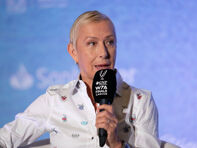With the Australian Open tennis championship set to start play January 20th, the big story surrounding the first Grand Slam event on the professional calendar isn’t the sport’s current stars. An accomplished and controversial icon perhaps looms larger.
In 1970, Australian Margaret Court became the second woman ever, and first woman in the Open era of modern pro tennis, to sweep the Australian Open, French Open, Wimbledon and the U.S. Open in the same calendar year.
The record-holding 24-time Grand Slam singles champion is now a Pentecostal Christian pastor who heads a large congregation in Perth, West Australia. Over the years, the Rev. Margaret Court, 77, has drawn the ire of contemporaries from her days on the tennis tour and on Australia’s national governing body for tennis, for a host of anti-LGBTQ statements, even as recently as this week.

During a sermon on Sunday, Court took pointed shots at the LGBTQ community, in particular transgender athletes and trans youth. “And you know with that LGBT, they’ll wish they never put the T on the end of it because, particularly in women’s sports, they’re going to have so many problems,” she stated from the pulpit. “You know, even that LGBT in the schools, it’s the devil, it’s not of God.”
These and other beliefs, such as characterizing being gay as a “choice”, come amid her demands for Tennis Australia to celebrate her achievement in a manner similar to how Rod Laver was lauded at the 2019 open. It was a celebration of the 50th anniversary of his second sweep of the Grand Slams in 1969.
Who is the Outsports Person of the Decade? Click here to see “The Outsports 20” list
In November, Court told both The Age and The Sydney Morning Herald that Tennis Australia had made no communications regarding the 2020 open. “They have never phoned me. Nobody has spoken to me directly about it. I think they would rather not confront it,” Court stated. “They brought Rod in from America. If they think I’m just going to turn up, I don’t think that is right. I think I should be invited. I would hope they would pay my way to come like they paid for his, and honor me. If they are not going to do that, I don’t really want to come.”
Tennis Australia responded with an open letter on November 30th saying that there has been plans in the works to recognize Court accomplishments during the weeks of the tournament. The plans include the debut of a mini-documentary on Court which was filmed in-part at her home in Perth over the summer.
The open letter also clarified Tennis Australia’s position on Court’s views. “As we have often communicated to Margaret, we respect that everyone has a right to an opinion — and a right to express it. Equally, we all share an obligation that while living our lives freely, we do not harm others, and we understand that there are consequences to our words.”
Her words in particular have been strident and contentious.

Prior to the 2012 Australian Open, Court spoke out in an interview with Reuters as Australian legislators were taking up the issue of marriage equality. ”To dismantle this sole definition of marriage and try to legitimise what God calls abominable sexual practices that include sodomy, reveals our ignorance as to the ills that come when society is forced to accept law that violates their very own God-given nature of what is right and what is wrong,” Court said.
Since starting her ministry and her church, the Perth-based Victory Life Center, in 1995, she has become a prominent Christian conservative voice in her country; Some would even say Christian dominionist.
Her stance against the LGBTQ community led to a rainbow flag protest in the arena named after her, and a sharply-worded op-ed response from out tennis legend Martina Navratilova. Court derided Martina as “a great player but I’d like someone at the top who the younger players can look up to. It’s very sad for children to be exposed to homosexuality.”
In 2017, after Australians voted for marriage equality by popular plebiscite and the national parliament made it law, Court’s public statements intensified in response to criticisms from current and forming touring pros, including rival Billie Jean King. The out tennis icon called for the Margaret Court Arena, located on the grounds of Australian Open site, to be renamed. Court retaliated, calling the women’s tour “a bunch of lesbians”.

As of December 1, further statements point to some type of understanding in place between Court and Tennis Australia.
“I’m looking forward to celebrating the 50th anniversary of winning the Grand Slam with my family and friends at the Australian Open,” Court told Tennis Australia, “This is an incredible milestone for me, and I can’t quite believe how quickly the time has gone. It’s always wonderful to catch up with my fellow legends and I’m grateful to Tennis Australia.
Tennis Australia responded in kind, noting that a great deal of programming was either scheduled or would be revealed closer to the opening week of the tournament.
At the same time, there is no sign that Court is going to moderate her statements about the LGBTQ community. As she stated in a 2016 interview, “I believe implicitly in what the Bible tells me. I do not cherry pick to be popular. God has made his feelings clear, and they are my feelings, too.”





































